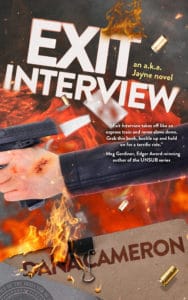You’ve tried going for a walk, had a cup of coffee (or four), and spent too much time on social media, and you still can’t move forward in your project. Here are a few of my favorite suggestions for nudging your muse into action.
Don’t start with “what if?”
I used to believe I couldn’t be a writer because the idea of asking “what if?” seemed too huge. “What if?” could be, literally, anything in the universe. Instead, I find it much more useful to start with the idea that pops into my head and then ask “what if?” Starting from somewhere concrete and then asking “what if?” narrows your options and focuses your story.
Always have a plan B
I swear by having a couple of WIPs going at the same time, if I possibly can, because if I’m stalled on one thing, I have the other to work on. And oftentimes, just turning your mind away from a problem for a moment gives your subconscious a chance to work it out—while you are still being productive elsewhere.
Is your plot part of your book (or another story altogether)?
A colleague was getting way off track with her book: She had followed a subplot so far, it had taken over. After some concentrated rewriting, she not only had the novel she’d intended to write, she had a novella she could sell as well. Waste not, want not! On the other hand…sometimes it happens that you think you are working on two separate projects that actually are part of the same thing. I was trying to write an archaeological thriller and a werewolf adventure. Neither was working…until I realized that the action scenes were the only thing working in the thriller and the werewolf adventure needed the archaeologist protagonist. Suddenly, magically, it all made sense as one book, which turned out to be Seven Kinds of Hell.
Why won’t my character come out to play?
I had plenty to write (and a deadline looming!), but my series protagonist didn’t seem to want to get involved. We clearly needed to have a heart-to-heart. I wrote her a short note explaining that I’d been caught up in my academic work, and felt bad I hadn’t spent enough time with her story. Then I wrote a response in her voice, and she pointed out that I’d been trying to make her story too much like my present work, which was not what was needed in a mystery novel! Another time, out of frustration, I wrote “you’re being boring!” When I answered in my protagonist’s voice, she said “Because you’re being boring! You give me the same problems over and over, but I’m really much more intelligent than that—challenge me!” Sometimes, just a few questions, written in character, can straighten you out.
Do you need to jump-start your brain?
Sometimes it helps to try improv theater techniques to get a story unstuck, by asking “What’s the strangest/funniest/scariest/coolest thing that could happen right now?” You can take Raymond Chandler’s advice about introducing a man with a gun at the door, or maybe it’s a banana? A fruit basket…a bouquet of roses? A stolen diamond? A letter from a long-dead relative you’ve never met? Sometimes it’s just a matter of playing with hyperbole until the right word suggests your way forward. Maybe it’s not an extraterrestrial who comes to the door, but it is someone who upends your character’s world. And if you find yourself tangled up in a cliché, flip the situation on its head: What would happen if it’s the opposite of the trope I’ve just written?
Are you bored?
If you are bored with what you’re writing, you know your readers will be too. Often, I find it’s because all my characters are in agreement, everyone being perfectly rational—which makes me happy in real life but is no way to create a thriller! If you find yourself in a rut, amp up the conflict and make sure your world is peopled with individuals who have opposed interests and goals.
Welcome your silent partner
Finally, Kelly Link often paraphrases Kate Wilhelm’s advice about treating your subconscious as your silent partner who will bring you lots of ideas without judging whether they are good or bad. Don’t be quick to dismiss something that isn’t a fully formed idea. If you reject everything that isn’t perfect, you’ll discourage your self from suggesting any inspiration at all.A real-life example: My husband came home after giving his resignation and said he had everything wrapped up except for the “exit interview” (in which you discuss the good and bad things about your job with your boss and team). It sounded awkward and uncomfortable to me, and then it occurred to me that it would be even more unpleasant if a covert operative was trying to leave her job…or her job was trying to get rid of her. That random thought led me to write my first espionage thriller, Exit Interview. So keep an open mind, and be willing to play with the thought to see if it leads somewhere productive.
How do you get unstuck? Let’s talk about it on the Career Authors Facebook page. And then, get writing!

Dana Cameron writes across many genres, but especially crime and speculative fiction (including the Fangborn novels). Her work, inspired by her career in archaeology, has won multiple Anthony, Agatha, and Macavity Awards, and has been nominated for the Edgar Award. Several of Dana’s Emma Fielding archaeology mysteries appear on the Hallmark Movie & Mystery Channel and are now streaming on Peacock. When she isn’t traveling, she’s weaving, spinning, or yelling at the TV about historical inaccuracies. Exit Interview (an a.k.a. Jayne novel) will publish December 6, 2022.”
Anthony, Agatha, and Macavity Awards, and has been nominated for the Edgar Award. Several of Dana’s Emma Fielding archaeology mysteries appear on the Hallmark Movie & Mystery Channel and are now streaming on Peacock. When she isn’t traveling, she’s weaving, spinning, or yelling at the TV about historical inaccuracies. Exit Interview (an a.k.a. Jayne novel) will publish December 6, 2022.”





